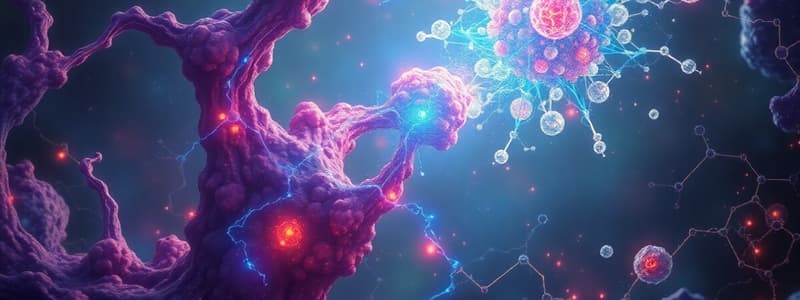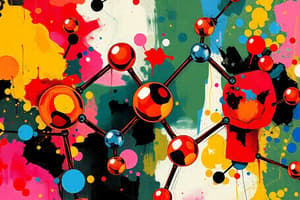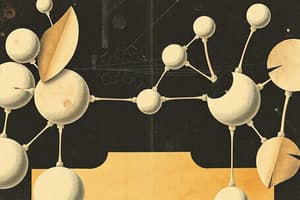Podcast
Questions and Answers
How many chiral carbons can be identified in the given molecular structures?
How many chiral carbons can be identified in the given molecular structures?
- Five
- Three
- Four (correct)
- Two
What is the classification of a carbon atom bonded to three other carbon atoms?
What is the classification of a carbon atom bonded to three other carbon atoms?
- Tertiary (3°) (correct)
- Secondary (2°)
- Primary (1°)
- Quaternary (4°)
Which type of carbon atom is bonded to only one other carbon atom?
Which type of carbon atom is bonded to only one other carbon atom?
- Secondary (2°)
- Quaternary (4°)
- Tertiary (3°)
- Primary (1°) (correct)
If a carbon atom is bonded to four different atoms/groups, what is its classification?
If a carbon atom is bonded to four different atoms/groups, what is its classification?
Which of the following statements regarding carbon classification is true?
Which of the following statements regarding carbon classification is true?
Which type of isomerism involves molecules with the same molecular formula but different structural arrangements of atoms?
Which type of isomerism involves molecules with the same molecular formula but different structural arrangements of atoms?
What is the hybridization of carbon atoms in the straight-chain isomer of butane?
What is the hybridization of carbon atoms in the straight-chain isomer of butane?
How many different constitutional isomers can be formed for the molecular formula C5H12?
How many different constitutional isomers can be formed for the molecular formula C5H12?
Which of the following best describes chain isomerism?
Which of the following best describes chain isomerism?
For hexane (C6H14), how many constitutional isomers exist?
For hexane (C6H14), how many constitutional isomers exist?
What is the shape of Ethene (C2H4)?
What is the shape of Ethene (C2H4)?
How many π bonds does Ethyne (C2H2) contain?
How many π bonds does Ethyne (C2H2) contain?
In the structure of Ethylene (C2H4), how many sp2 hybridized carbon atoms are present?
In the structure of Ethylene (C2H4), how many sp2 hybridized carbon atoms are present?
What type of hybridization is present in Ethyne (C2H2) carbon atoms?
What type of hybridization is present in Ethyne (C2H2) carbon atoms?
What is the number of σ bonds in Ethane (C2H6)?
What is the number of σ bonds in Ethane (C2H6)?
Which of the following correctly describes Ethylene's bonding?
Which of the following correctly describes Ethylene's bonding?
Which molecule has a linear shape?
Which molecule has a linear shape?
Which statement about the bonding in Ethylene (C2H4) is true?
Which statement about the bonding in Ethylene (C2H4) is true?
What is the geometry of methane (CH4) due to sp3 hybridization?
What is the geometry of methane (CH4) due to sp3 hybridization?
What types of orbitals combine to form sp3 hybrid orbitals?
What types of orbitals combine to form sp3 hybrid orbitals?
Which characteristic is true about the four C–H bonds in methane?
Which characteristic is true about the four C–H bonds in methane?
What is the percentage of s character in sp3 hybrid orbitals?
What is the percentage of s character in sp3 hybrid orbitals?
Who provided the mathematical explanation for hybridization in carbon?
Who provided the mathematical explanation for hybridization in carbon?
What is the bond angle in a tetrahedral arrangement such as in methane?
What is the bond angle in a tetrahedral arrangement such as in methane?
Which statement best describes sp3 hybrid orbitals?
Which statement best describes sp3 hybrid orbitals?
How many total hybrid orbitals are formed from the hybridization of one s and three p orbitals?
How many total hybrid orbitals are formed from the hybridization of one s and three p orbitals?
What characterizes the configuration of the Z isomer in E-Z notation?
What characterizes the configuration of the Z isomer in E-Z notation?
Which of the following statements is true regarding the E-Z notation?
Which of the following statements is true regarding the E-Z notation?
In E-Z notation, how are group priorities determined?
In E-Z notation, how are group priorities determined?
What is the correct configuration of cis-2-butene according to geometric isomerism?
What is the correct configuration of cis-2-butene according to geometric isomerism?
Which of the following represents a trans isomer?
Which of the following represents a trans isomer?
What distinguishes cis isomers from trans isomers in geometric isomerism?
What distinguishes cis isomers from trans isomers in geometric isomerism?
If an alkene has higher priority substituents on opposite sides of the double bond, which configuration does it exhibit?
If an alkene has higher priority substituents on opposite sides of the double bond, which configuration does it exhibit?
For which type of alkenes are the terms cis and trans insufficient?
For which type of alkenes are the terms cis and trans insufficient?
Which of the following is a characteristic of a primary alcohol?
Which of the following is a characteristic of a primary alcohol?
What is the functional group present in carboxylic acids?
What is the functional group present in carboxylic acids?
Which functional group structure does this formula represent: R-CO-NH2?
Which functional group structure does this formula represent: R-CO-NH2?
Identify the functional group in the compound represented as R-CH=CH-R.
Identify the functional group in the compound represented as R-CH=CH-R.
Which option best represents a secondary amine?
Which option best represents a secondary amine?
What distinguishes a ketone from an aldehyde at the molecular level?
What distinguishes a ketone from an aldehyde at the molecular level?
What functional group is represented by the formula R-COOR'?
What functional group is represented by the formula R-COOR'?
Which compound type is characterized by the presence of a nitro group (–NO2)?
Which compound type is characterized by the presence of a nitro group (–NO2)?
Which of the following compounds is an example of an anhydride?
Which of the following compounds is an example of an anhydride?
What defines the structure of an aromatic compound?
What defines the structure of an aromatic compound?
Flashcards
Hybridization
Hybridization
A process where atomic orbitals combine to form new, equivalent hybrid orbitals.
sp3 hybridization
sp3 hybridization
A type of hybridization where one s orbital and three p orbitals combine to form four equivalent sp3 hybrid orbitals.
sp3 hybrid orbitals
sp3 hybrid orbitals
New, equivalent orbitals resulting from the combination of an s orbital and three p orbitals, with a tetrahedral orientation.
Tetrahedral orientation
Tetrahedral orientation
Signup and view all the flashcards
Methane (CH4)
Methane (CH4)
Signup and view all the flashcards
s and p orbitals
s and p orbitals
Signup and view all the flashcards
Valence electrons
Valence electrons
Signup and view all the flashcards
Ethylene Structure
Ethylene Structure
Signup and view all the flashcards
Ethyne structure
Ethyne structure
Signup and view all the flashcards
sp Hybridization
sp Hybridization
Signup and view all the flashcards
sp2 Hybridization
sp2 Hybridization
Signup and view all the flashcards
sp3 Hybridization
sp3 Hybridization
Signup and view all the flashcards
Sigma (σ) bond
Sigma (σ) bond
Signup and view all the flashcards
Pi (π) bond
Pi (π) bond
Signup and view all the flashcards
Ethane Structure
Ethane Structure
Signup and view all the flashcards
Ethene Structure
Ethene Structure
Signup and view all the flashcards
Hybridization of N2
Hybridization of N2
Signup and view all the flashcards
Hybridization of N3
Hybridization of N3
Signup and view all the flashcards
Isomers
Isomers
Signup and view all the flashcards
Structural Isomerism
Structural Isomerism
Signup and view all the flashcards
Stereoisomerism
Stereoisomerism
Signup and view all the flashcards
Chain Isomerism
Chain Isomerism
Signup and view all the flashcards
Constitutional isomers of C5H12
Constitutional isomers of C5H12
Signup and view all the flashcards
Constitutional isomers of C6H14
Constitutional isomers of C6H14
Signup and view all the flashcards
Cis-trans Isomers
Cis-trans Isomers
Signup and view all the flashcards
Cis Isomer
Cis Isomer
Signup and view all the flashcards
Trans Isomer
Trans Isomer
Signup and view all the flashcards
E-Z Notation
E-Z Notation
Signup and view all the flashcards
Z Isomer
Z Isomer
Signup and view all the flashcards
E Isomer
E Isomer
Signup and view all the flashcards
Cahn-Ingold-Prelog Rules
Cahn-Ingold-Prelog Rules
Signup and view all the flashcards
Chiral Carbon
Chiral Carbon
Signup and view all the flashcards
Primary Carbon
Primary Carbon
Signup and view all the flashcards
Secondary Carbon
Secondary Carbon
Signup and view all the flashcards
Tertiary Carbon
Tertiary Carbon
Signup and view all the flashcards
Quaternary Carbon
Quaternary Carbon
Signup and view all the flashcards
Functional Groups
Functional Groups
Signup and view all the flashcards
Alkyl Halide
Alkyl Halide
Signup and view all the flashcards
Alcohol
Alcohol
Signup and view all the flashcards
Ether
Ether
Signup and view all the flashcards
Nitrile
Nitrile
Signup and view all the flashcards
Nitro
Nitro
Signup and view all the flashcards
Amine
Amine
Signup and view all the flashcards
Aldehyde
Aldehyde
Signup and view all the flashcards
Ketone
Ketone
Signup and view all the flashcards
Carboxylic Acid
Carboxylic Acid
Signup and view all the flashcards
Ester
Ester
Signup and view all the flashcards
Amide
Amide
Signup and view all the flashcards
Anhydride
Anhydride
Signup and view all the flashcards
Study Notes
Hybridization
- Bonding in hydrogen molecules is straightforward, but more complex in organic molecules with tetravalent carbon atoms.
- Methane (CH₄) is an example. Carbon has four valence electrons (2s² 2p²), forming four bonds.
- All four C-H bonds in methane are identical, oriented towards the corners of a regular tetrahedron.
- This is explained by hybridization: an s orbital and three p orbitals combine to form four equivalent sp³ hybrid orbitals with tetrahedral orientation.
- These sp³ hybrid orbitals are unsymmetrical around the nucleus.
sp³ Hybridization and the Structure of Alkanes
- A carbon atom's basic state has electrons in the 2s and 2p orbitals.
- In an excited state, one electron from the 2s orbital moves to a 2p orbital.
- The orbital hybridization involves mixing the 2s and 2p orbitals, producing four sp³ hybrid orbitals.
- These sp³ orbitals are arranged tetrahedrally, forming 109.5° angles.
sp² Hybridization and the Structure of Alkenes
- Carbon atoms in alkenes (C=C) form sp² hybrid orbitals.
- The 2s and two 2p orbitals combine, resulting in three sp² hybrid orbitals with 120° angles.
- One unhybridized 2p orbital remains perpendicular to the sp² planes, allowing for pi (π) bonding.
sp Hybridization and the Structure of Alkynes
- Carbon atoms in alkynes (C≡C) form sp hybrid orbitals.
- The 2s and one 2p orbital combine, forming two sp hybrid orbitals with 180° angles.
- Two remaining unhybridized 2p orbitals are perpendicular, forming two π bonds.
Covalent Bonding of Carbon
- sp³: Four sigma (σ) bonds, tetrahedral shape (e.g., methane, ethane).
- sp²: Three sigma (σ) bonds and one pi (π) bond, trigonal planar shape (e.g., ethene).
- sp: Two sigma (σ) bonds and two pi (π) bonds, linear shape (e.g., ethyne).
Types of Organic Formulas
- Molecular formula: Shows the number of each type of atom in a molecule.
- Empirical formula: Shows the simplest whole-number ratio of atoms in a molecule.
- Condensed formula: Shows the atoms in a molecule, with carbons listed separately, and attached atoms following.
- Displayed formula: Shows all atoms and bonds as lines.
- Structural formula: Similar to displayed, but not all bonds are shown.
- Bond-line formula: Hydrogen atoms are omitted; line ends/vertices represent carbons.
Isomerism
- Isomers are different compounds with the same molecular formula but different arrangements of atoms.
- Constitutional isomerism: Different connectivity of atoms.
- Chain isomerism: Different carbon atom arrangements.
- Position isomerism: Different positions of functional groups.
- Functional group isomerism: Different functional groups.
- Ring-chain isomerism: Open-chain vs. cyclic structures.
- Stereoisomerism: Same connectivity but different spatial arrangement.
- Geometric isomerism: Different spatial arrangements around a double bond (cis/trans or E/Z).
- Optical isomerism: Non-superimposable mirror images (enantiomers).
- Constitutional isomerism: Different connectivity of atoms.
Chirality and Biological Properties
- Chirality refers to molecules that are non-superimposable mirror images.
- Chiral carbons have four different groups attached, leading to enantiomers.
- Biological molecules often interact with only one enantiomer due to chiral binding sites.
Classification of Carbon Atoms
- Primary (1°): Bonded to one other carbon atom.
- Secondary (2°): Bonded to two other carbon atoms.
- Tertiary (3°): Bonded to three other carbon atoms.
- Quaternary (4°): Bonded to four other carbon atoms.
Functional Groups
- Functional groups are specific groups of atoms within molecules that give characteristic chemical properties.
- Examples include alkyl halides, alcohols, ethers, amines, aldehydes, ketones, carboxylic acids, esters, amides, nitriles, and nitro groups.
Studying That Suits You
Use AI to generate personalized quizzes and flashcards to suit your learning preferences.




